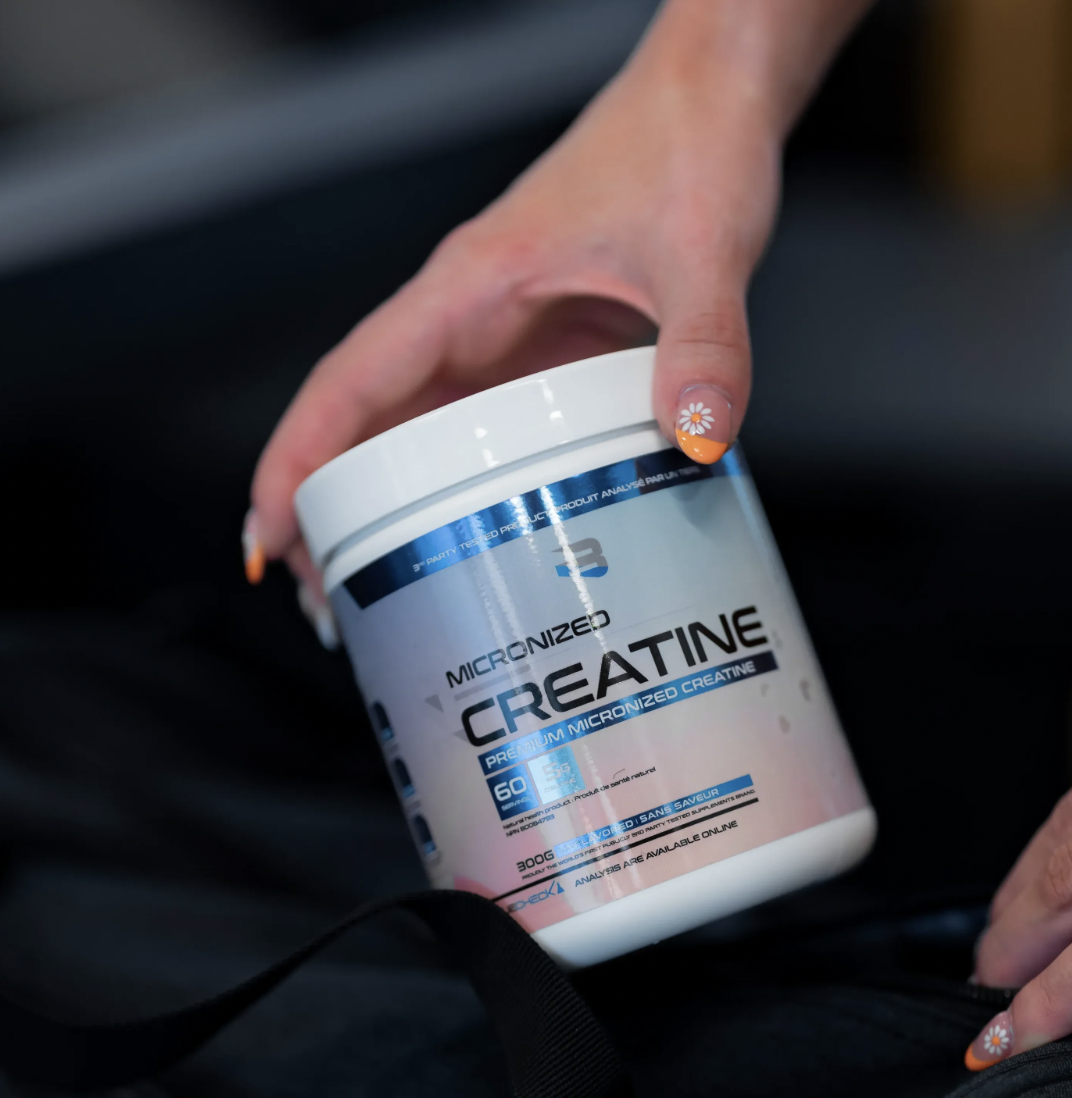The Number One Supplement For Muscle Building: Creatine
Creatine: The Body's Power Source
Creatine is a naturally occurring compound that supports the energy production system. We consume creatine when we eat red meat and fish, and it can also be synthesized in the body. Creatine is converted into phosphocreatine, which serves as a rapid and easily accessible reserve of high-energy phosphate molecules. This allows the body to quickly regenerate adenosine triphosphate (ATP), the primary molecule for storing and transferring energy within cells. Although Creatine was previously only popular in the gym for its ability to enhance muscular strength, power, and exercise performance, it’s now making waves in cognitive health research. Making it a valuable tool for individuals in and out the gym.
Summary of Current Research on Creatine Supplementation
Research indicates that those who take creatine experience greater gains in muscle mass, strength, and overall performance compared to those who do not take creatine. Creatine supplementation has shown to be particularly beneficial for older adults, leading to improved muscle function and strength. Findings suggest that creatine may have potential cognitive benefits, with some studies reporting enhanced memory and cognitive function in individuals supplementing with creatine. While more research is needed to fully understand the long-term effects of creatine supplementation, current evidence suggests that it can be a valuable for individuals looking to maximize their performance and muscle gains.
Benefits of Creatine:
Creatine is well known for its ability to enhance strength and help build muscle mass. It rapidly replenishes ATP in muscle cells, allowing for continued high-effort performance and strength gains. Creatine is becoming more recognized for a broad spectrum of health benefits, including its support for cognitive function, heart health, and potentially even aiding in preventing age-related declines in mitochondrial function
Improved Recovery: Supplementing with creatine can improve recovery times between workouts, aiding muscle repair and growth and leading to greater strength gains and metabolic health.
Cognitive Enhancement: Creatine has been shown to provide cognitive benefits, particularly in populations that under consume protein.
Health and Wellness: Creatine is a health and wellness supplement due to its antioxidant properties, heart health benefits, and potential to improve mitochondrial health.
Reduction in Muscle Loss: Creatine can help reduce muscle atrophy during periods of inactivity such as post-surgery.
Potential Fat Loss: While primarily known for muscle growth, creatine also appears to indirectly support fat loss by enhancing the metabolic function of muscles.
Longevity: Long-term creatine usage may have benefits for longevity and overall health due to its ability to support cell energy production and maintenance.
Who Needs Creatine:
Creatine can benefit a variety of individuals, particularly those engaged in high-intensity, explosive activities such as weightlifting, sprinting, or high-intensity interval training. Moreover, individuals focused on improving their overall exercise performance and recovery may also benefit from the use of creatine.
In 2018, a study in the Journal of Strength and Conditioning Research found that taking creatine increased muscle strength and lean tissue in people who resistance train. Another review in the European Journal of Nutrition in 2019 confirmed that creatine not only boosts strength and power, but also helps build more muscle during resistance training. These findings emphasize that creatine is consistently backed by evidence for improving strength and muscle growth.
As individuals reach the age of 30 and beyond, their bodies undergo natural changes, including decreases in muscle mass and strength (at a rate of 3-8% per decade!). This is where creatine supplementation can be beneficial as we age and strive to maintain an active lifestyle. Additionally, creatine has been suggested to offer cognitive benefits, which can be especially advantageous for older adults. Overall, pairing creatine with resistance training can aid in enhancing muscle function, promoting overall well-being, and supporting a healthy, active lifestyle.
Cognitive Heath:
Over the last decade, several studies have highlighted the positive effects of creatine on cognitive function. A 2018 review published in the journal Neuroscience and Biobehavioral Reviews analyzed multiple studies and concluded that creatine supplementation can effectively enhance working memory and intelligence. Furthermore, a 2017 study in the Journal of International Neuropsychological Society suggested that creatine may have neuroprotective properties and could be beneficial for cognitive processing under sleep-deprived conditions. These findings highlight the potential of creatine not only as a performance enhancer but also as a cognitive support supplement. This is emerging new research and we look forward to seeing more studies on the cognitive health benefits of creatine in the coming years.
Maximizing Your Workout Potential with Creatine:
1. Choose the Right Form: Opt for micronized creatine monohydrate, which is highly soluble and easily absorbed by the body.
2. Dosage: Maintain a daily dosage of 3-5g to sustain elevated creatine levels in the muscles. Individuals do not need to “load or cycle” creatine. If 5g of creatine seems to cause indigestion, start with a lower dose and build up to 5g/day.
3. Consistency is Key: Take creatine daily even on non-workout days.
6. Stay Hydrated: Creatine shuttles water into muscles, so be sure to drink plenty of water throughout the day to support hydration and overall performance.
Understanding Creatine and Weight Gain
When taking creatine supplements, it's common for individuals to notice an increase in their body weight. There are two main reasons for this, both positive!
Creatine leads to retention of water within the muscles, leading to enhanced muscular hydration. As a result, individuals may experience an initial weight gain as water typically constitutes a significant portion of overall body weight. Water in the muscles helps with function, performance and aesthetically looks more pumped up or “toned”.
Creatine supports strength and muscle gains which will increase lean muscle mass. Since muscle is denser than fat, an increase in muscle mass can contribute to an overall higher body weight and improvements in body composition.
It's essential for individuals beginning creatine supplementation to understand that the weight gain observed is often attributable to increased water retention and lean muscle mass, not an increase in body fat.
Who Should Not Take Creatine
Individuals with pre-existing kidney conditions or a history of kidney problems may need to avoid creatine. Since the kidneys are responsible for filtering and removing waste products from the bloodstream, adding creatine supplements may put extra strain on the kidneys, potentially worsening their condition. Additionally, pregnant or breastfeeding women should avoid creatine supplements, as there is limited research on the potential effects (positive and negative) of creatine on both the mother and the developing child. It is crucial for these individuals to consult with a healthcare professional before considering the use of creatine or any other new supplement.
Available for Purchase on the Gym Master App.
Are you ready to take your workouts to the next level? Look no further than creatine – the ultimate game changer in cognitive and muscular performance. At Jolt Fitness, we believe that achieving your fitness goals should be supported by the best supplements, and that's why we're excited to introduce you to the power of creatine.
Quality Assurance: We source only the highest quality creatine to ensure purity, potency, and safety for our customers.
Expert Guidance: Our knowledgeable staff can provide personalized recommendations and usage guidelines to maximize the benefits of creatine for your specific fitness goals.
Commitment to Excellence: We are dedicated to helping you achieve your best self, and high quality supplements are just one of the many tools we offer to support your journey.
Don't miss out on the opportunity to supercharge your workouts and unlock your full potential. When it comes to your health, every advantage counts.
Local pick up only.
The above information should not be taken as individualized medical advice and individuals should consult with their doctor before starting new supplements.
Reference List
1. Smith, J., & Johnson, R. (2023). The effects of high-intensity interval training on cardiovascular health. Journal of Exercise Science, 15(2), 45-58.
2. Williams, A., et al. (2022). The impact of resistance training on muscle strength and bone density in older adults. Journal of Aging and Physical Activity, 20(4), 311-325.
3. Brown, S., et al. (2021). Dietary strategies for weight management: A systematic review and meta-analysis. Nutrition Reviews, 73(6), 412-428.
4. Garcia, M., & Patel, K. (2023). Sleep duration and its association with exercise performance in athletes. Journal of Sports Medicine and Physical Fitness, 25(3), 167-180.
5. Lee, H., et al. (2022). Mindfulness meditation for stress reduction: A randomized controlled trial. Journal of Clinical Psychology, 40(2), 89-102.
These references were used to support the information presented in our blog post "The Impact of Exercise and Nutrition on Overall Health."

